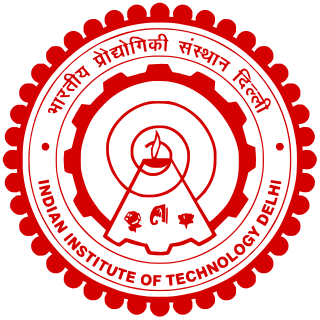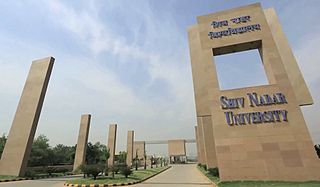
The Indian Institute of Technology Bombay is a public research university and technical institute in Mumbai, Maharashtra, India.
In India, a deemed university or deemed-to-be-university is an accreditation granted to higher educational institutions in India by the Ministry of Education. According to the ministry's definition, the accreditation indicates, "an Institution of higher education, other than universities, working at a very high standard in specific area of study" and the accreditation grants "the academic status and privileges of a university".

University Grants Commission is a statutory body under Department of Higher Education, Ministry of Education, Government of India. It was set up in accordance to the UGC Act 1956 and is charged with coordination, determination and maintenance of standards of higher education in India. It provides recognition to universities in India, and disbursements of funds to such recognized universities and colleges. The UGC headquarters are in New Delhi, and it has six regional centres in Pune, Bhopal, Kolkata, Hyderabad, Guwahati and Bangalore. A proposal to replace it with another new regulatory body called HECI is under consideration by the Government of India. The UGC provides doctoral scholarships to all those who clear JRF in the National Eligibility Test. On an average, each year ₹725 crore (US$87 million) is spent on doctoral and post-doctoral fellowships by the commission.

National Institute of Technology Durgapur, formerly known as Regional Engineering College, Durgapur, is a public technical university in the city of Durgapur in West Bengal, India. Founded in 1960, it is one of India's oldest technical universities. It is located on a campus of 187 acres (0.75 km²).

The Manipal Academy of Higher Education(MAHE) is a private deemed university in the Udupi district of Karnataka, India. The school has campuses in Mangalore, Bangalore, and Jamshedpur in India, as well as global campuses in Dubai and Malaysia. Its sister universities are Manipal University Jaipur and Sikkim Manipal University, run by same organization.

Jamia Hamdard is an institute of higher education deemed to be university located in New Delhi, India. Established in 1989, it is a government-funded university and was formally inaugurated by then Indian prime minister Rajiv Gandhi. In 2019, it was awarded Institute of Eminence status by Ministry of Human Resource Development.

Kalinga Institute of Industrial Technology (KIIT), formerly KIIT University, is a private deemed university located in Bhubaneswar, Odisha, India. It offers 34 undergraduate, 32 postgraduate, 10 integrated, 11 Ph.D and 7 postdoctoral research programmes in the fields of science and engineering, medical science, management, law, film and media, humanities and yoga and sports.

Karunya Institute of Technology and Sciences, formerly Karunya University, is a private deemed university in Coimbatore, Tamil Nadu, India. It was founded by D. G. S. Dhinakaran and his son Paul Dhinakaran.

The Indian Institute of Technology Delhi(IIT Delhi) is a public institute of technology located in Delhi, India. It is one of the 23 Indian Institutes of Technology created to be Centre of Excellence for India's training, research and development in science, engineering and technology.
In India, Institute of National Importance (INI) is a status that may be conferred on a premier public higher education institution by an act of the Parliament of India for such institutions which, "serve as a pivotal player in developing highly skilled personnel within the specified region of the country or state." Institutes of National Importance receive special recognition, higher autonomy, and direct funding from the Government of India. Some of India's highest ranked universities, including all of the IITs, NITs, AIIMSs,IISERs and IIMs, have this status.

The Ministry of Education (MoE) is a ministry of the Government of India, responsible for the implementation of the National Policy on Education. The ministry is further divided into two departments: the Department of School Education and Literacy, which deals with primary, secondary and higher secondary education, adult education and literacy, and the Department of Higher Education, which deals with university level education, technical education, scholarships, etc.

Higher education system in India includes both public and private universities. Public universities are supported by the union government and the state governments, while private universities are mostly supported by various bodies and societies. Universities in India are recognized by the University Grants Commission (UGC), which draws its power from the University Grants Commission Act, 1956. The main governing body is the University Grants Commission, which enforces its standards, advises the government, and helps coordinate between the center and the state. Accreditation for higher learning is overseen by various autonomous institutions established by the University Grants Commission (UGC).

Institute of Chemical Technology (ICT) is a public deemed university in Mumbai, India. The institute also has campuses at Bhubaneswar, Odisha and Jalna,. It is focused on training and research in the fields of chemical engineering, chemical technology, and pharmaceutical sciences. It was established in 1933 and was granted deemed university status in 2008, making it the only state-funded deemed university in India. On 12 February 2018 it was given the status of Category 1 institute with graded autonomy by the Ministry of Human Resource Development and the University Grants Commission (India). It is also an institute with a special status as mentioned in SECTION IV of the Report of the Empowered Expert Committee in 2018.

O.P. Jindal Global is a private deemed to be university located at Sonipat in Haryana, India. It was established in 2009 as a philanthropic initiative of its founding chancellor, Naveen Jindal, in memory of his father, O.P. Jindal. The university offers 45 programmes in law, liberal arts, life sciences and business. In 2020, UGC named JGU as an Institute of Eminence.

Shiv Nadar University is a private deemed university located in Greater Noida, in the northern Indian state of Uttar Pradesh. It was founded in 2011 as part of a series of initiatives launched by the Shiv Nadar Foundation, a private philanthropic foundation founded by Shiv Nadar, the founder and chairman of HCL.

India has the largest numbers of engineers as well as the largest number of engineering education institutes and infrastructure in the world. As of 2021, India annually produces 1.5 million engineering graduates. India's technical education infrastructure includes 2500 engineering colleges, 1400 polytechnics and 200 schools of planning and architecture.
V Ramgopal Rao is an Indian academic serving as the vice chancellor of Birla Institute of Technology and Science, Pilani. He was previously the director of IIT, Delhi for six years during 2016-2021.

National Institutional Ranking Framework (NIRF) is a ranking methodology released annually by the Ministry of Education, Government of India, to rank institutions of higher education in India. The framework was approved by the former Ministry of Human Resource Development and launched by the Minister on 29 September 2015.















